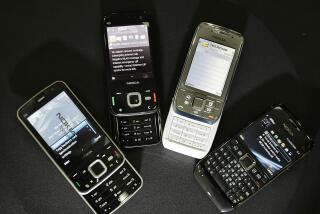For Many, Cell Phones Alter Reality
- Share via
After a morning spent hiking in New Zealand’s spectacular Rotorua region--a volcanic area of geysers, thermal pools and surreal landscapes--my tour guide, Jacqui, heard the chirping of her cell phone. She was on call for her day job, and while I marveled at the fact that her phone worked in the middle of nowhere, she was copying down the information being relayed to her.
Then, with a puzzled look, she turned to me and asked, “Do you know anyone named Jon Fortt?”
Normally, that’s not the sort of question to send a chill up my spine. But my pal Jon was house-sitting for me back in Santa Monica as I celebrated New Year’s Eve down under. With visions of earthquakes and mudslides, I quickly called Jon back on the other side of the globe.
Talk about your transformative technologies.
This transcontinental game of telephone tag would have been simply impossible just a few years ago. The awesome power of Dick Tracy’s two-way wrist radio--once literally comic book science--is available to the masses today.
Despite significant reliability problems, cell phones have fundamentally altered reality for many of us. The fact that Jon and I were able to instantly communicate with each other is incredible. And the way Jon found Jacqui’s number is a good indication of how the world is really changing.
It turned out that I’d neglected to give Jon a full set of keys. This was deliberate on my part. I figured the fewer keys he had to deal with, the less complicated his life would be. Unfortunately, somebody triggered a lock that was normally never used. Jon returned to my place in the wee hours of Jan. 1, 2001, to discover that he was locked out.
Happy freakin’ New Year.
Jon hung out till morning and politely asked my landlord to let him in. My landlord declined without my say so--a problem since Jon had absolutely no idea how to reach me.
Which was why, at 10 a.m. on Jan. 1 in Death Valley, the shriek of a cell phone tore through the stillness. My friends Matt and Christina were hiking the mountains. They didn’t expect a cell phone to work in that wilderness, so the ringing shocked them both.
Jon, being a resourceful fellow, rang up Matt because he knew Matt was married to Christina, who happens to be Jacqui’s sister. Christina provided her mother’s number in Auckland. Jon called her and she relayed the information to Jacqui, who passed the message along to me. I left a message for my landlord describing Jon. And my landlord let Jon back in. Problem solved.
The ability to instantaneously communicate any time, anywhere--even in Death Valley or the wilds of New Zealand--makes life better for us on any number of levels.
For instance, it’s much easier now to meet up with people if everybody packs a cell phone. Getting lost isn’t the frustrating experience it once was if you can call up and get guidance on the fly. Driving in your car and walking in an isolated area are safer because you can always call for help with a cell.
The only problem is that this transformative technology can’t be relied upon to always function when it’s most needed.
Park rangers have noted a number of incidents in which inexperienced hikers were more willing to accept a higher level of risk because they had a cell phone. The problem is that there are dead zones in cell coverage, and if your life depends on that connection, it’s not just your cell that’ll be dead.
And part of the reason that Jon had to jump through all those hoops to find me is that I wasn’t carrying my own cell phone, which had to be surgically removed from my hip for this trip. There wasn’t any point in carrying it because the United States uses a different type of cell technology from much of the rest of the world, so my phone won’t work in New Zealand.
In addition, Jon couldn’t make an international call directly out on his cell phone. He had to use a calling card, which increased the hassle factor enormously.
We won’t even get into the hassles of trying to use your cell phone in the midst of a mob of people also trying to use their cell phones, with all those signals stepping on each other. But I expect that within two years, cell companies will offer “premium” service--at a premium price--to users willing to pay for the privilege of jumping to the front of the line.
The notion offends the egalitarian part of me. But the practical side of me is ready to sign up. I can’t imagine life without my cell phone. And I think better cell phones really will make my life better.
That, and leaving my house guests a full set of keys.
*
Dave Wilson is The Times’ personal technology columnist.
*
Inside
* Dave Wilson answers reader questions in Tech Q&A.; T8
More to Read
Sign up for Essential California
The most important California stories and recommendations in your inbox every morning.
You may occasionally receive promotional content from the Los Angeles Times.













